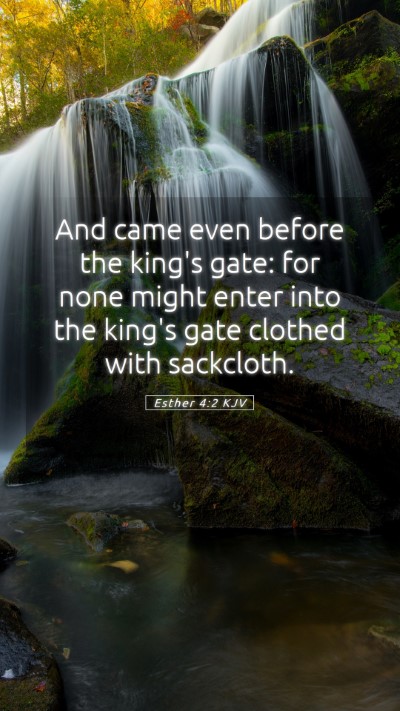Old Testament
Genesis Exodus Leviticus Numbers Deuteronomy Joshua Judges Ruth 1 Samuel 2 Samuel 1 Kings 2 Kings 1 Chronicles 2 Chronicles Ezra Nehemiah Esther Job Psalms Proverbs Ecclesiastes Song of Solomon Isaiah Jeremiah Lamentations Ezekiel Daniel Hosea Joel Amos Obadiah Jonah Micah Nahum Habakkuk Zephaniah Haggai Zechariah MalachiEsther 4:2 Meaning
What is the meaning of Esther 4:2?
And came even before the king's gate: for none might enter into the king's gate clothed with sackcloth.
Esther 4:2 Bible Verse Meaning
Understanding Esther 4:2
Esther 4:2 is a pivotal verse in the Book of Esther, where its significance is heavily rooted in the context of the Jewish people's plight and the courage required to confront adversity. The verse reads:
"And he went up to the gate of the king's house, for none might enter into the king's gate clothed with sackcloth."
Bible Verse Meanings
This verse conveys several layers of meaning, especially regarding outward expressions of grief and despair during perilous times. Let's delve into the insights provided by various public domain commentaries.
Commentary Insights
-
Matthew Henry:
Henry emphasizes the significance of Esther’s uncle, Mordecai, who dons sackcloth, a traditional attire symbolizing mourning. His act of wearing sackcloth at the king's gate signifies both personal grief and the collective mourning of the Jewish community facing annihilation.
-
Albert Barnes:
Barnes points out the restrictions placed within the Persian court, indicating that entering the king's gate in sackcloth represented a stark contrast to the royal decorum. This highlights the severity of the situation and Mordecai's determination to signal the urgency of their plight.
-
Adam Clarke:
Clarke elaborates on the idea of public mourning, noting that Mordecai's actions serve as a catalyst for Esther to realize the dire fate awaiting her people. He stresses the importance of recognizing one’s responsibility in the face of communal peril.
Biblical Exegesis
Esther 4:2 is not merely a historical account but a profound lesson on courage, responsibility, and the impact of individual actions on the community. The verse invites readers to explore how outward appearances reflect inner convictions and the importance of standing firm against injustice.
Applying Bible Verse to Daily Life
In today's context, the message of Esther 4:2 urges believers to recognize their role in advocating for those who are oppressed or in distress. It encourages action and the necessity of making one's struggles known, whether within a community or before authority.
Cross References
- Jonah 3:6: The king of Nineveh’s response to the call for repentance showcases a similar theme of communal mourning and the call for action.
- Nehemiah 1:4: Nehemiah hears of Jerusalem’s troubles and fasts for the people, embodying the same spirit of desperation and responsibility.
- Matthew 5:14-16: The call for Christians to be lights in the world parallels Mordecai's actions that highlight the need for courage in the face of darkness.
Conclusion
Esther 4:2 serves as a crucial reminder of the implications of one's struggle and the inherent call to fulfill responsibilities toward others in times of crisis. By understanding this verse, readers can gain valuable Bible study insights and reflect on how such ancient wisdom applies to contemporary challenges.
Endnote
We invite you to use this exploration of Esther 4:2 as a springboard for deeper Bible study. Whether in Bible study groups or through online Bible study, discussing the implications of such verses can lead to profound understandings of Scripture.


